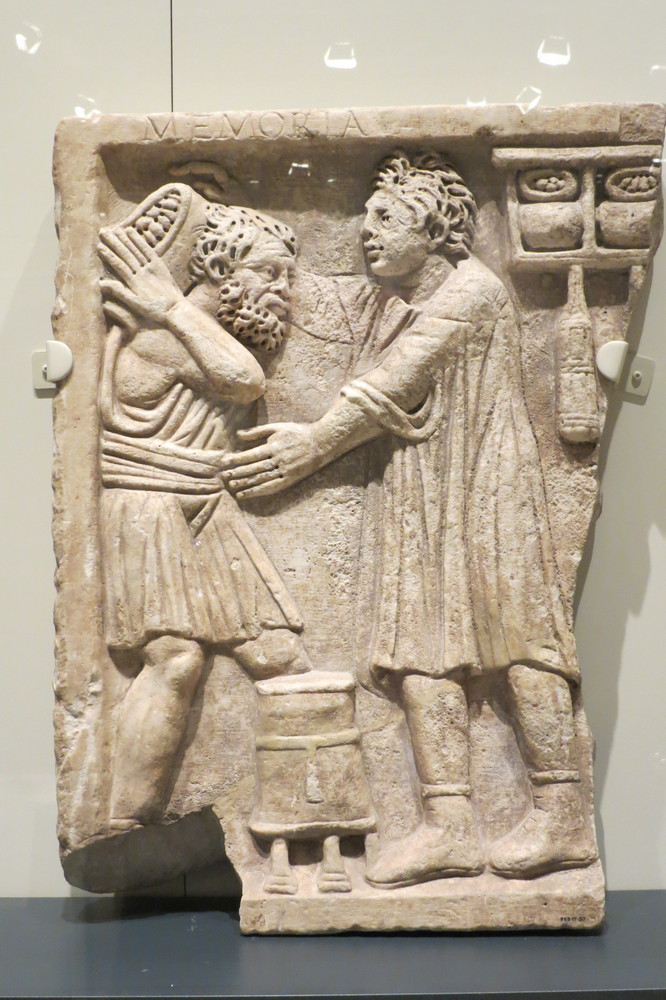RS32: Resurrection of the Son of Man
A: Did you know ahead of time — before you went to Jerusalem — that you were going to die? Most Christians believe you were prophesying your own death in Mark 8:31.
J: Well, I did know my time was running out, but I kept that suspicion to myself. So the question about the Son of Man in the Gospel of Mark is a separate question. When Mark talks about the Son of Man being rejected, killed, and resurrected, Mark isn’t talking about me or any other human being. For me, and also for my great-nephew Mark, “Son of Man” meant humanity’s highest potential, humanity’s ability to transcend terrible suffering and turn it into something positive and life-enhancing. Not “life” as in existing and surviving, but “life” as in choosing to do what’s right with courage and conviction and respect for all creatures.
Like Job, a person who refuses to take “no” for an answer in his quest to be in full relationship with God is going to go through some difficult times. To search for love and trust in a world that rejects love and trust is no easy task. There will be no support from “the elders, the chief priests, and the scribes” in this quest. Those in authority will do their best to destroy your dogged determination to find the truth about your heart and soul. They certainly won’t reward you for teaching others how to hear God’s voice. But at the end of the day, they can’t stop these truths from being constantly reborn in the hearts and minds of those who believe in humanity’s highest potential.
This is the kernel of divine truth that lies at the heart of the resurrection story. The truth about Divine Love can be temporarily crushed — killed by the elders, chief priests, and scribes — but it always returns. It always reignites in the hearts of those who are listening to God through the lens of the heart.
A: But Peter and James and John didn’t like what you were saying.
J: That’s an understatement. Compare what Mark says about choosing between status and “life” (e.g. Mark 8:34-9:1) to what John says throughout his gospel. For John, it’s all about the status. Status so pure and so elevated it will save you.
A: A lot of Christians have been confused by Mark’s statement that those who want to save their life will lose it, and those who lose their life based on your teachings will save it. But it makes perfect sense in the context of choosing between status (“gaining the whole world”) and losing your ability to love and trust (“forfeiting their life/soul”). Seems pretty clear, actually.
J: These passages (plus some others) in Mark have often been interpreted as an endorsement of asceticism. I want to emphasize that I didn’t ever teach or endorse the practice of asceticism. And I didn’t teach the practice of self-dissolution. I taught the practice of denying the cravings of status addiction. I taught the practice of “taking up the cross.”
A: Can you explain that in more detail?
J: The Romans in the first century CE were brutal tyrants, despite all their talk of honour and law and Pax Romana. Their culture was profoundly status-oriented.
A: As many cultures continue to be to this day.
J: Yes. Romans held great store in the rights of citizenship. If you were a Roman citizen, you had special rights and privileges. Citizenship was a sign that you were favoured by the gods. But if you weren’t a citizen — and most Jews in the province of Palestine weren’t — you had no recourse to the laws that applied exclusively to Roman citizens. If the Romans didn’t like you, they could crucify you. Tens of thousands — hundreds of thousands — of people who weren’t citizens ended up on crosses throughout the Roman Empire. Theoretically, however, citizens couldn’t be crucified. So the cross became a symbol of disenfranchisement — of being cut off from the ancient rights and privileges that had accrued to various ancient peoples over the centuries. Second Temple Judaism had built up a strong body of laws. But these laws meant nothing if the Romans took a dislike to you. A lot of disenfranchised Jews ended up on crosses.
A: Yet you were a Roman citizen. And they put you on a cross.
J: Yes. Which is why they had to take me down after only a few hours. But the cross isn’t what put me at death’s door. I was almost dead by the time they tied me up there.
A: Tied? I thought the Romans nailed people in place.
J: It was a bit of a rush job. They would have come back later to properly nail me down if they hadn’t been forced to take me down from the cross after an old friend alerted the authorities to the crime of crucifying a Roman citizen.
A: Why were you almost dead?
J: I’d been in prison for three months. I’d been stabbed in the lower abdomen by John. I’d been poisoned by Peter. But I didn’t have the decency to die in prison. So finally, late in September, my brother James got fed up. He bribed some officials to send me out with a batch of prisoners who were scheduled to die. He didn’t think anyone would recognize me and raise a ruckus. He was wrong.
A: So your own brother was the one who tried to make you die an ignominious death on the cross. That’s just . . . well, there are no words for such a betrayal.
J: My older brother Judas was in on the original plan to capture me and put me in prison. But when the rest of the story unfolded . . . he couldn’t take the guilt. He committed suicide.
A: You say you’d been in prison for three months, and you were tied to the cross in September. That doesn’t add up with the Passover timeline.
J: John created the Passover timeline. It suited his mystical belief that I’d been overlighted by God. He also couldn’t remember, from a factual point of view, when I’d been arrested. His memory for poetry and scripture was excellent, but his memory for historical facts and dates was very poor.
A: So in his mind your arrest did take place in the early spring at Passover.
J: Yes. And, as always, he was persuasive in his charismatic prophecy, so people took him at his word. He said it happened at Passover, so this date was quickly embraced by new followers after my death. From everyone’s point of view, there was a lovely mystical symmetry — even a mystical necessity — in this date.
The truth is that I didn’t go to Jerusalem for Passover in my final year. It was a shocking heresy on my part, but I couldn’t agree to go to the Temple to participate in a festival I believed was morally wrong. I couldn’t agree to participate in a ceremony that celebrated the escape of one group of people through the death of innocent children — children who were murdered by an avenging God. And all the other plagues . . . the whole thing felt wrong to me at a gut level.
A: Starting to see why your family hated you so much. You rejected one of their cherished traditions. One of the traditions that gave them status.
J: I rejected traditions founded in hatred and vengeance. But there were other traditions worth keeping. This is why I went to Jerusalem seven weeks later for the celebration of Shavuot (Weeks) — what Christians later called Pentecost. Shavuot was a whole different kettle of fish. Shavuot was about gratitude — thanking God for the bountiful gifts of food in the first harvest. I had no use for the Passover laws, but I saw how Shavuot could be a time of real healing and redemption for Jews of faith — like an ancient but very Jewish version of Christmas, with people sharing their gifts and their hearts with each other and with God.
My problem was that I said this out loud. I gathered my friends and family and followers together, and presented them with this “new version” of Shavuot — a supper where we would sit together as equals and invite God the Mother and God the Father to share a humble meal of bread and water with us.
A: The Last Supper.
J: And it was, indeed, my last supper as a human being where my body wasn’t filled with pain and fear. I was arrested later that night.
A: Had you decided before you went to Jerusalem that you were going to suggest this “new Shavuot”? Or was it a last minute idea — a sudden flash of inspiration?
J: I knew before I went. I also knew I’d make a lot of new enemies for daring to change old customs in this way. But it was the right thing to do. So I did it.
A: So you knew ahead of time you risked arrest, even death.
J (nodding): I knew.
A: And you didn’t try to stop it.
J: Don’t get me wrong. I wasn’t trying to be a martyr. And I didn’t want to be arrested and tortured. I saw no joy or fulfillment in that prospect. On the other hand, I wasn’t going to back down. I wasn’t going to lie to other people about who God is. I wasn’t going to pretend that all Jewish traditions were blessed by God, because, you know, they weren’t. I wasn’t afraid to tell the truth.
The truth about love and trust, about humanity’s ability to love God and trust God, about God’s choice to love humanity and trust humanity, always manages to be reborn. No death can stop it from happening.
The Son of Man always returns in the hearts and smiles and courage of those who love. It’s our inheritance as children of God.












